Sustainable Land Use and Management System (SLUSE) - Alumni
SLUSE 2020
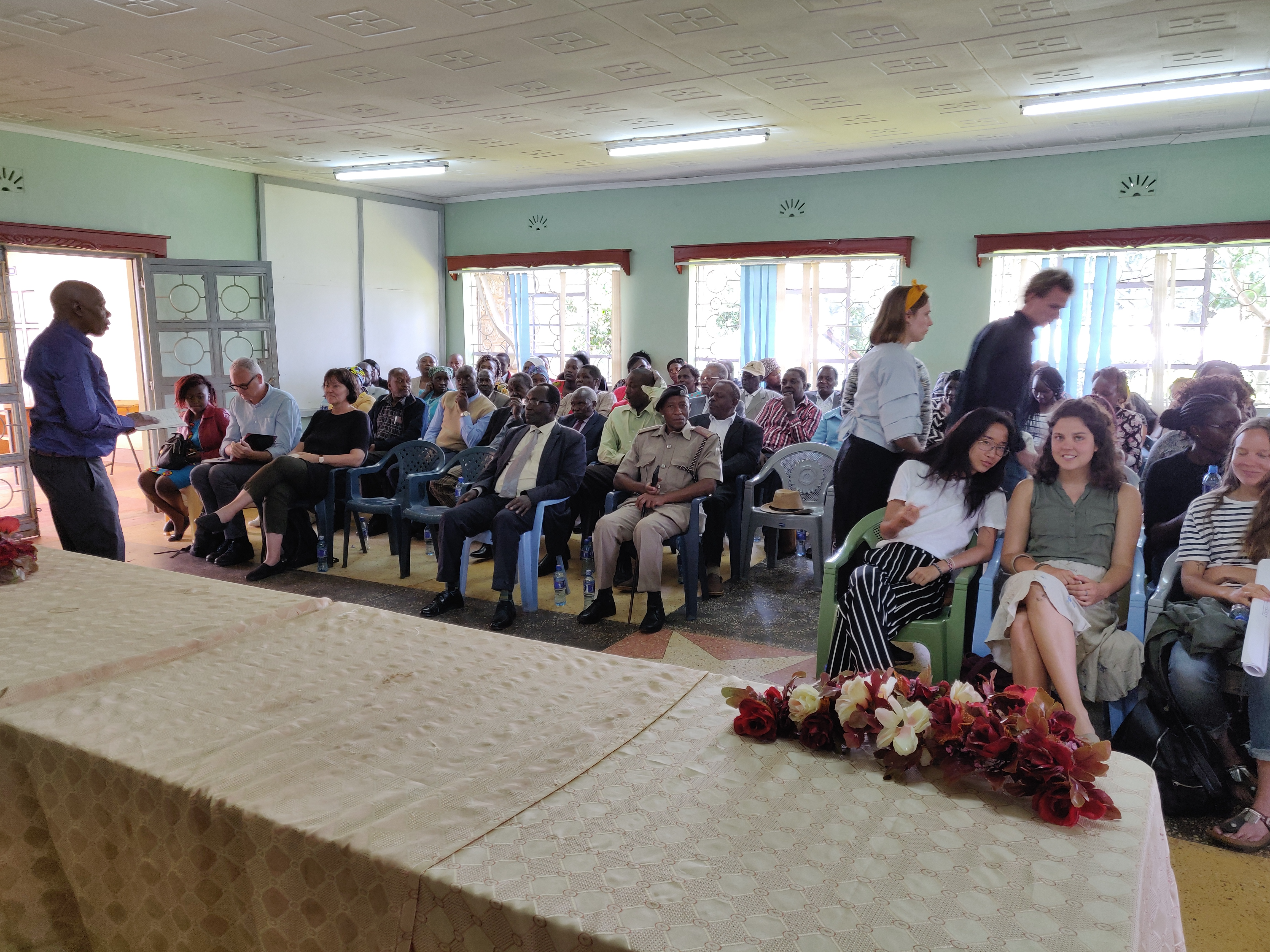
The 2020 experiential field training was conducted in Karima ward, Othaya Sub-County, Nyeri County, from 27th February, 2020 to 10th March, 2020 by the Wangari Maathai Institute for Peace and Environmental Studies, University of Nairobi in collaboration with the University of Copenhagen and University of Roskilde, Denmark. The students came from different fields of learning including Geography and Geoinformatics, Environment and Development, Anthropology, Climate Change, Environmental and Natural Resource Economics, Forest and Nature Management, among others and was attended by thirty four (34) students, twenty three (23) international students from both the University of Copenhagen and Rothskilde University and eleven (11) from the University of Nairobi – Wangari Maathai Institute. They represented sixteen (16) nationalities. The five (5) research themes included solid waste management in Othaya and its environs, crop insurance scheme for maize, soil fertility management, tea certification and community forestry.
Participants List
A: Solid Waste Management
- Mary Asoyo (F)
- Dennis Wachira (M)
- Anna Planke (F)
- Anine Selander (F)
- Mette Kowalski (F)
- Nele Paulsen (F)
- Teresa Andersen (F)
B: Crop Insurance For Maize
- Emilie Baagøe (F)
- Anna Davidsen (F)
- Sofie Grave (F)
- Pia Franziska Kreimeyer (F)
- Rhoda Marimba Wambui (F)
- Domnic Sironga Ntialei (M)
- Sebastian Hanika (M)
C: Soil Fertility Management
- Alexander Almodovar (M)
- Pier Paolo Chinellato (M)
- Simon Claesson Kaarsberg (M)
- Clara Guio Garcia (F)
- Sofia Maia Goldstein (F)
- Elizabeth Nasimiyu Ndombi (F)
- Rita Njeri Moraa Atuti (F)
- Francis Waweru (M)
D: Tea Certification
- Amelia Katla Ahring (F)
- Signe Vestergaard Dam (F)
- Kirstine Damgaard Henriksen (F)
- Sofie Nielsen (F)
- Mercy Wangari Kamau (F)
- Jane Wanjiku Kiiru (F)
E: Community Forestry
- Helen Bai (F)
- Julia Lynn de Candido (F)
- Sisko Laitinen (F)
- Beatrice Waithera Kinyua (F)
- Oscar Allen (M)
- David Kipchumba Ruto(M)
Asked about the most outstanding positive aspects of the SLUSE field course, most students cited the following:
- Good cooperation with Kenyan students
- Excellent learning experience
- Amazing hospitality and positive reception by local/host families
- Experienced supervisors
- Learnt new culture
SLUSE 2019
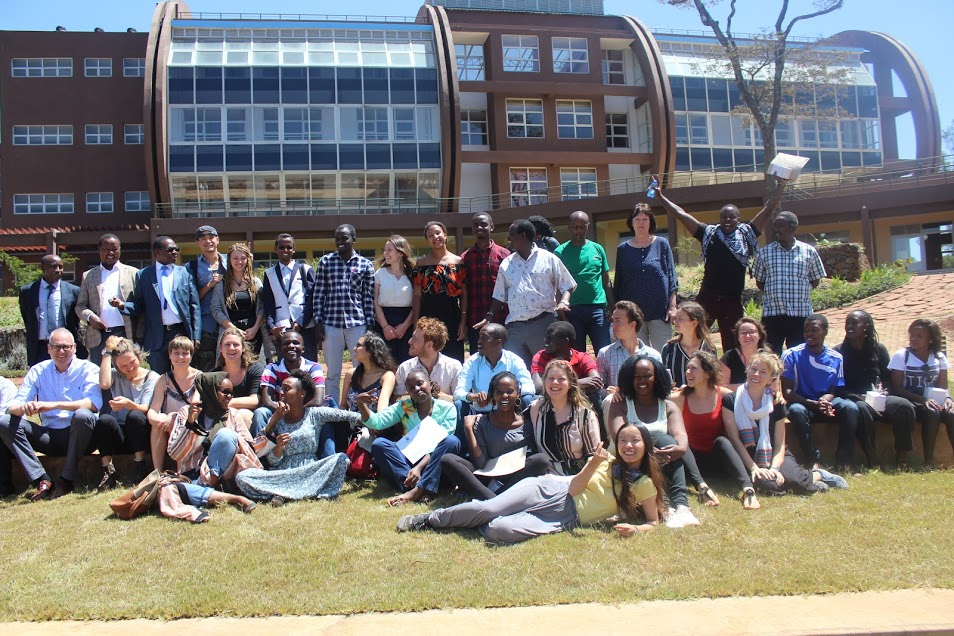
The Wangari Maathai Institute for Peace and Environmental Studies in collaboration with the University of Copenhagen and University of Roskilde, Denmark successfully implemented the 2019 experiential field learning course dubbed, “Sustainable land use management system – (SLUSE),” which was the 7th in a series after the SLUSE 2012, 2014, 2015, 2016, 2017 and 2018. The program was held in Kibugu ward, Embu County, from March 1, 2019 to March 12, 2019. It incorporated students from various disciplines including environmental governance, agriculture, sociology, anthropology, economics, forestry, livestock production and law and was attended by thirty four (34) students, sixteen (16) international students from both University of Copenhagen and Roskilde University and eighteen (18) from the University of Nairobi-Wangari Maathai Institute & the Department of Geography and Environmental Studies.
Participants List
A: Irrigation
- Millicent Wairimu Ng’ang’a (F)
- Hanti Hussein (M)
- Ibrahim Yussuf (M)
- Omar Manasiti (F)
- Maria Cristina Suta (F)
- Xiao Tan (M)
- Juliane H. Jacobsen (F)
B: Livestock
- Peter Ndungu (M)
- Dama Nelly Kaose (F)
- Irene Mutesi (F)
- Lang'at Nickson (M)
- Maimona Nakato Jouret (F)
- Axelle Cordier (F)
- Ryan Ausker (M)
C: Macadamia
- Matthew Muruana Wachira (M)
- Karen Mutuku (F)
- Stephen Muuo Rukwaro (M)
- Miluska Bravo (F)
- Bingzhi Zhu (F)
- Signe H. Schoenning (F)
- Annika M. Röckle (F)
D: Microfinance
- Francis Kahuha (M)
- Lunalo Cletus Lunalo (M)
- Mary Njoki (F)
- Ngicho Vincent (M)
- Anne Katrine H Hansen (F)
- Anna Teresia Molander (F)
- Ian Good (M)
E: Soil Fertility
- Kerichu Caroline Wanjiku (F)
- Mburu Geraldine (F)
- Obonyo Oscar (M)
- Victoria Gimpel (F)
- Line Maj Hedegaard (F)
- Katharina Hoisl (F)
SLUSE 2018
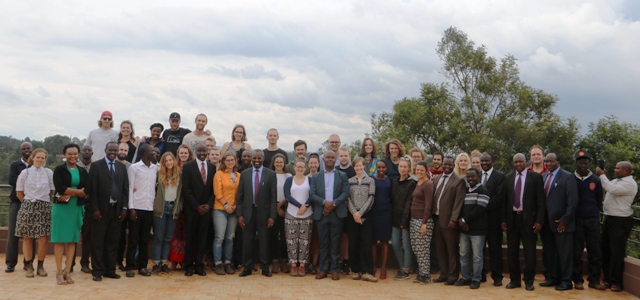
The 2018 experiential field traning was implemented in Othaya, Nyeri County, from March 2-13, 2018 by the Wangari Maathai Institute for Peace and Environmental Studies, University of Nairobi in collaboration with the University of Copenhagen and University of Roskilde, Denmark. It incorporated students from various disciplines including environmental governance, agriculture, sociology, anthropology, economics, forestry, livestock production and law and was attended by thirty four (37) students, twenty seven (27) international students from both University of Copenhagen and Roskilde University and ten (10) from the University of Nairobi-Wangari Maathai Institute. The SLUSE research areas hinged around six (6) thematic areas including application of citizen Science in management of pest and diseases; Livestock Production as driven by prevailing milk market; Microfinance support for SLUSE; Household governance in relation to SLUSE; Irrigation support for SLUSE and Coffee production
Participants List
Pest and Disease Management
- Abel Kiprono, Kenyan, (M)
- Iason Koutroumpelas, Greece, (M)
- Simon Siantidis, German, (M)
- Laura Møller Schmidt, Danish, (F)
- Manon Bourqui, Swiss, (F)
Livestock Production
- Lilian Gakuhi Kenyan, (F)
- Sofia Cereghetti Swiss, (F)
- Magnus Winther Jessen, Danish, (M)
- Signe Aagaard Bendtsen, Danish, (F)
- Molly Hass, USA, (F)
- Osuman G. Kiazolu, Kenyan, (M)
- Martin Boehm, Danish, (M)
Agriculture Finance
- Aveline Bies, Dutch, (F)
- Katrine Lindholm, Danish, (F)
- Elmah Odhiambo, Kenyan, (M)
- Steve Tapley, Canadian, (M)
- Elena Allegri, Italian, (F)
- Signe Bering Jensen, Danish, (F)
Ageing Households
- Phyllis Wamaitha, Kenyan, (F)
- Louise Branlard, French, (F)
- Helene Lærke Hannibal, Danish, (F)
- Moses Ndarua, Kenyan, (M)
- Aslak H.C. Christiansen, Danish, (M)
- Jesse Jones, USA, (M)
Irrigation
- Sara Svalgaard, Danish, (F)
- Joyce Nthuku, Kenyan, (F)
- Philipa Olivia Dige, Danish, (M)
- Laurits Muchitsch Kromann Hesselager, Danish, (M)
- Harrison Kirimi Kenyan, (M)
- Piotr Wozniakowski, Polish, (M)
Coffee Production
- Lillian Kyalo, Kenyan, (F)
- Katrine Friborg, Danish, (F)
- Anaïs Carpente, French, (F)
- Cecilie Steen Hansen, Danish, (F)
- Derek McKee, USA, Male
- Jorritvan der Schot, Danish, (M)
- Gituanja Gachie, Kenyan, (M)
SLUSE course was really enjoyable this year. I had a lot of great learning experiences as well as cultural experiences learning from the people. I think there is a lot of a positive to take away from it, not only educational experiences but also learning the way of the people in Kenya and seeing agriculture from different lens from what we are used to. I also really enjoyed getting to know the Kenyan students and the guides specifically and some friendship that will last a long time.”
Steve Tapley, MSc. student, Agricultural Development, University of Copenhagen
SLUSE 2017
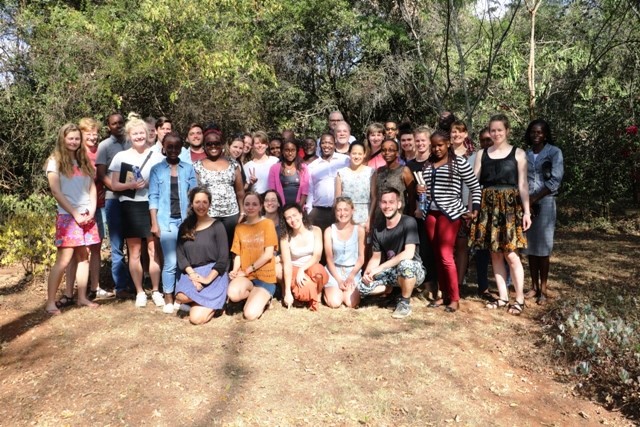
The WMI in collaboration with the University of Copenhagen and University of Roskilde, Denmark conducted the SLUSE 2017 experiential field exercise in Embu County, Kibugu Location from March 2-13, 2017. The course was attended by a total of thirty-four (34) students, twenty-two (22) international students from both University of Copenhagen and Roskilde University and twelve (12) from the University of Nairobi-Wangari Maathai Institute.
Participants List
Agribusiness in horticulture: empowerment and gender dynamics - Prof Mutembei/Dr Mutune
- Musa Zakariyyah Nigeria (M)
- Gitau Mercy Wanja Kenya (F)
- Jimmy Owiti Kenya (M)
- Celina Dahl Swedish (F)
- Marion Cauvet French (F)
- Julie Agger Johannessen Danish (F)
- Sanahé DERUELLE French (F)
- Alberte Reinholt Thomsen Dansk (F)
Crop Farming technologies – soil erosion control and agroforestry - Dr Kiemo/Abdi
- Christine Nyangweso Kenya (F)
- Lucy Wanjiru Njoka Kenya (F)
- Lucky Cinny Kenya (F)
- Alice Bardet France (F)
- Maite Jurado Jimenez España (F)
- Tim Harper United States (M)
- Amalie Jensenius Danish (F)
Dynamics and determinants of livestock production - Dr Kunyanga / Dr. Maina
- Antonia Herm-Stapelberg, German (F)
- Emily Kilonzi Kenya (F)
- Simon Lekembe Kenya (M)
- Mary Kageni Kenya (F)
- Emily Kinsel American (F)
- Astrid Bertelsen Danish (F)
- Daniel Ellehammer Larsen Danmark (M)
Pest and disease management practices in crops - Dr Thenya/Dr Cecilia
- Camilla Lund Madsen Danmark (F)
- Emilie Gad Danish (F)
- Jeannette Sophie Hinrup Danish (F)
- Frederik Lund-Sørensen Danish (M)
- Natasha Nailenya Kenya (F)
- Peter Kiprop Kenya (M)
Post-harvest handling and value addition - Dr Jane Mutune/ Dr. Maina
- Henriette Hansen Denmark (F)
- Lærke Durkee Danish (F)
- Maria Catalina Diaz Perdomo Colombia/ USA (F)
- Andreas Nørklit Christiansen Danish (M)
- Will Fulwider United States (M)
- Salad Tutana Kenya (M)
- Grace Ndinda Kula Kenya (F)
- Agnes Wekesa Kenya (F)
SLUSE 2016
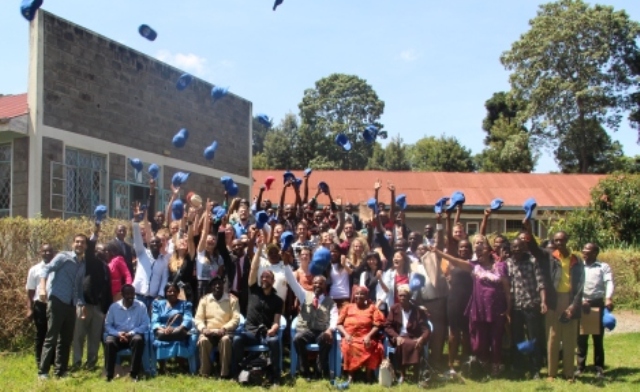
Wangari Maathai Institute for Peace and Environmental Studies in collaboration with the University of Copenhagen held a prolific 2016 experiential training which will took place in Nyeri South Sub County from 3rd to 14th March 2016. The course was attended by 30 international students (from both University of Copenhagen and Roskilde University) and 10 students from the Wangari Maathai Institute
SLUSE 2015
SLUSE 2015 programme was held at Lari District, Kiambu County, Kenya from the 27th February to 11th March 2015. The course was attended by 20 international students (from both University of Copenhagen and Roskilde University) and 10 local Kenya students.
SLUSE 2014

SLUSE 2014 was held in Othaya, Nyeri Country in March 2- 14, 2014. The students were divided into the following five thematic groups including soil fertility management, livestock production, community participation in Karima forest management, coffee production & marketing and milk production & marketing. The course was attended by 36 students (24 international students 12 local Kenyan students)
Participants List
Addressing the challenges of soil fertility management
- Anne D Møller (F)
- Tanja Lübbers (F)
- Pernille S. Nielsen (F)
- Pin Pravalprukskul (F)
- Grace Kinyori, (F)
- Rhoda Nyamai (F)
- Erick Akotsi (F)
The importance of livestock production to household livelihood (Witima)
- Dr Odera Owino (M)
- Negar Latifi (F)
- Norman M Casas (M)
- Peter Worm (M)
- Margot Roux (F)
- Lærke N Nielsen (F)
- Dr. Naomi Kemunto
Community participation in Karima forest management (Gakina)
- Emilie Skensved (F)
- Audrey Atchade (F)
- Sofie H Thygesen (F)
- Trine Løber (F)
- Maria Hald (F)
- Erastus Gitonga
- Grace Ogechi Kemunto
The opportunities and challenges in coffee production and marketing (Gatugi)
- Astrid S Andersen (F)
- Haftu H Gebremichael (M)
- Thomas Eisler (M)
- Naja Skouw-Rasmussen (F)
- Issa Kapande (M)
- Rosemary Gichure
- Gerphas Opondo
The opportunities and challenges in milk production and marketing (Giathenge)
- Caroline Hambloch (F)
- Fabien Eric F Jean-Louis (M)
- Karolin Andersson (F)
- Francis Denisse M Rodriguez (F)
- Natasha A Dottin (F)
- Brenda Kamara
- Dr. Daniel Korir
- Harriet Oboge
SLUSE 2012
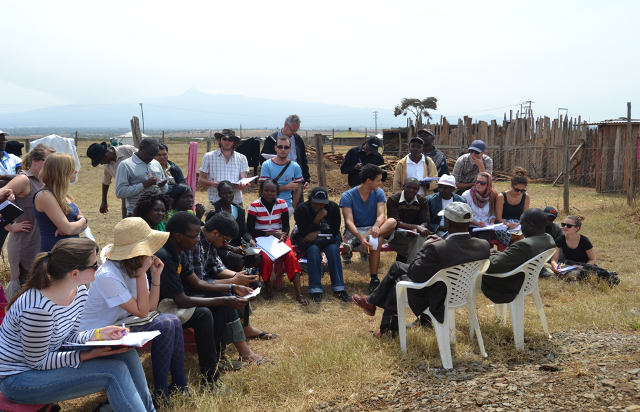
WMI in Collaboration with the University of Copenhagen and Green Belt Movement conducted an experiential learning course at Solio Ranch from 1st to 13th of March 2012. The course entitled “Sustainable Land Use and Natural Resource Management (SLUSE): From Theory to Practice through field-based training” was focused on learning by doing. The course was attended by 25 international students (Danish 14, Romania 1, German 1, British 1, USA 1, Nepali 1, Myanmar 1, Poland 1, Ethiopia 1, Bangladesh 1, Italian 1, and Norwegian 1) and 15 local Kenyan students.
Participants List
- Alexander Fernandes, (M), Dutch
- Amalie Miranda Zeeman, (F), Danish
- Anna Madalinska, (F), Poland/USA
- Anne Mette Pagh Glarbo, (F), Danish
- Arjun Pandey V, (M), Nepali
- Augn Myo Thant, (M), Myanmar
- Cecilie Heide Sørensen, (F), Danish
- Dario Mancinelli, (M), Italian
- Firaol Ufga, (M), Ethiopia
- Jeanne Malene Kofoed-Jensen, (F), Danish
- Julie Marie Rasmussen, (F), Danish
- June Haugane, (F), Norwegian
- Kristen Kelly, (F), USA
- Lise Schou Nørgaard, (F), Danish
- Maria Amrani, (F), Danish
- Marie Raasthøj Hansen, (F), Danish
- Mark Wilson, (M), British
- Md. Waliul Galib, (M), Bangladesh
- Rebecca Lynge, (F), Danish
- Sabrina Meersohn Meinecke, (F), Danish
- Saskia Reppin, (M), German
- Sebolelo Kirstine Laurberg Mohapeloa, (F), Danish
- Søren Brangstrup Schou, (M), Danish
- Lazar Cosmin Stefan, (M), Romania
- Tine Irming Lindskrog (F), Danish
Experience is the best teacher,” My week in Solio Village 3,
We have an expression in my country - “experience is the best teacher”, and I believe these are wise words. Earlier this year, I was lucky enough to take part in a course in Kenya organised by the Wangari Maathai Institute for Peace and Environmental Studies and Copenhagen University. The course is called Sustainable Land Use and Natural Resource Management, and it brings together students from Denmark and Kenya so that we can learn how to conduct research in the field. We spent 11 days living in a rural community in Solio, near Naro Moru, and our project focused on the importance of agriculture to livelihoods.
A typical day for us in the village... we would wake up at 7, with the cockerels crowing and the sunlight rising from behind Mount Kenya – a beautiful sight! After breakfast our group of 10 students would break into small teams, and we visited the village homesteads. We asked the farmers about the crops they grow and the challenges they face, and took some soil samples. In the evening everyone would gather again back at our camp for a tasty dinner of ugali and beans.
Finally, we would discuss our results and plan the following day’s activities. Through our interviews we learnt that the people in Solio were resettled there 3 years ago by the Government of Kenya, after living for many years by road sides or in the slums of nearby towns. Each family was given a smallholding, and although many of the farmers have good farming knowledge, so far the crop yields have been low. Maize, for instance, has failed every year due to frost or a lack of rainfall. The farmers do not have the money to invest in water harvesting structures, but they have started growing trees, which offer both wind protection and soil moisture retention. They have also diversified their livelihood activities to provide more security. On reflection, I would say this is the kind of learning you cannot get from reading books - you meet people face to face, and develop an understanding of their aspirations, their hardships, and their perspectives on life. You also learn how to work effectively in a group, and how to implement your research plan. Learning through experience is not always easy, but it is the most rewarding.
"Learning through experience is not always easy, but it is the most rewarding."Mark Wilson, Student at Copenhagen University (MSc Agricultural Development
